- neereis
My Notes on My Liberation Notes

Something good will happen to you today.
With a simple premise and a slow, linear pace, My Liberation Notes had everything to be tiresome. But it didn't. Carefully constructed and tied up in its details and proposition, the drama is a perfect example of how it is possible to tell a simple story (without cliffhangers or hundreds of twists) in an excellent way. Before you know it, the story hits you in sensitive spots like a steamroller, and at the same time it hurts, it heals.
The drama tells the story of a family living in Sanpo, a rural area outside Seoul, following GiJeong (Lee El), ChangHee (Lee Minki) and MiJeong (Kim JiWon) as they go through their daily routines between home-walk-bus-train-work-bus-walk and repeating the same routine over and over and over again; plus living with their new neighbor, the quiet Gu (Son Sukku), who is also an employee at the sink factory owned by the brothers' father. Minki commented in an interview that the drama is almost a documentary, and I think the same. The repetition of the routines takes us to that region, makes us feel as if we are living with them the exhaustions, the difficulties, and the needs; but it also makes us dream together.
And that is one of the high points of the drama. The development of the characters is incredible, both individually and collectively. There is no neglecting any of them, no matter how small the screen time is, the script embraces the pains and ambitions of all the characters in such a raw and honest way, that sometimes the feeling is bittersweet: we live along with them, in this painful routine of longing for what one needs and trying to get what one wants, confirming, sometimes, that the greatest ability of human beings is simply to exist. In Park HaeYoung's lines we realize that we all need release, that it is possible to find happy pills amidst the inertia of the days because, if we are lucky, "something good will happen to us today."
Créditos: tt @Sequence925
My notes on the sense of reality
The internal questionings of most people (myself included!) are imprinted on the screen in a very realistic way. The loneliness I feel whenever thoughts about the future arise; the emptiness and introspection; the natural fears of youth and old age; the need to love and be loved; the hierarchical relationships, competition, and abuse in the workplace; the agonies about not making progress while everyone else seems to be "accomplishing something, achieving something"... feelings of the inhabitants of Sanpo, of Seoul, of the Brazilian countryside.

Each character is shown in light and shade, just as we are. The scales of gray justify the behaviors and actions, needing no further explanation because we understand. And why do we understand? Because we feel as they do. And there is no right answer in this question because living is not objective proof.
My notes on worship

MiJeong wanted to feel whole, worthy of love, and asked the stranger next door to worship her (DJ, play False God by Taylor Swift, please!); wondering if he would like to be worshipped too. "How do you worship someone?" he asked. "You root for that person. You tell them they can do anything because anything is possible," she replied. And that got me thinking about how much easier it is to verbalize very intimate things to people who are initially complete strangers. About how our emptiness and longings, so deep, so human, are almost never verbalized for fear of how we will feel, how the other will receive our feeling because, unfortunately, we go through life feeling this kind of sensation and wishing to be filled since there is nothing sadder than a tree that never blooms.
And an invitation to worship is an invitation to change the key between withering away to death or watering to birth. And almost nobody is willing to sow their own seeds, let alone another's. Because it requires time, care, detachment, and connection. This is how relationships are nurtured. This is how intimacy is strengthened.
Sometimes I think that damaged people are much more honest than those who live their happy lives.
My Notes about Love
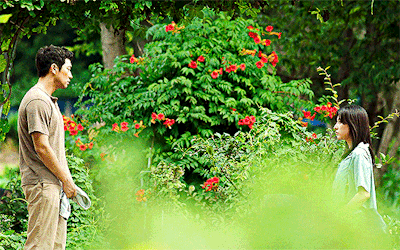
MiJeong and Gu's relationship, so unusual but so beautiful, made me rethink several things. Katy Perry, in one of my favorite songs in her repertoire, sings about finding love through signs: "If stars don't align / If it doesn't stop time / If you can't see the sign, wait for it / One hundred percent / Worth every penny spent / He'll be the one that finishes your sentences / If it's not like the movies / That's how it should be / When he's the one, I'll come undone / and my world will stop spinning" And when that dear friend of ChangHee's (played by Han SangJo) talks about how whenever he sees the woman he likes, his heart speeds up, it confirms the universal theory that love goes hand in hand with "butterflies in the stomach."
Maroon 5, on the other hand, states that love "isn't always rainbows and butterflies / It's a compromise that moves us along" and this makes me think of the main couple in My Liberation Notes. Because MiJeong is quick to retort that her heart speeds up only when something bad might happen because when she loves someone, her heart beats even slower, she goes into a state of peace as if she is freeing herself from something. For heaven's sake, I was completely shaken!
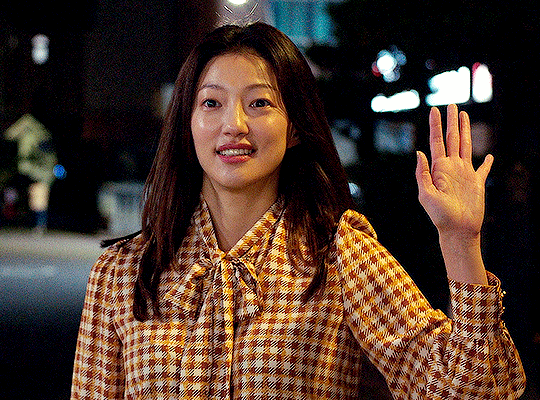
GiJeong, the older sister and character who spoke to me the most, maybe because I took a while to accept that a lot of her resides in me (I think without 'maybe', but I'm not ready for this conversation yet, lol) lives on a tightrope of despair. And every change in her look is a reflection of her low self-esteem, of the feelings she doesn't express or expresses too much and fucks up, of the dreams she represses, of the family and societal pressures she feels. Everything about her is too much. She feels too much, talks too much, talks too fast. And, what's more, it's what she always wanted. The relationship she builds with TaeHoo (Lee KiWoo) imprints on the screen a realistic example of first times residing in second (or third!) times, that reminder that life is a set of first times even if sometimes we forget that and blame ourselves for not being as confident or as wise.
In the middle of a conversation about "relationship rules to establish control," she not only demonstrated her dissatisfaction in that little game of hide-and-seek in which she scores whoever plays the hardest or answers last, but also starred in one of my favorite scenes: "Why is it a good thing to make him anxious? You get anxious and it drives you crazy. Isn't that bad? That's uncomfortable, isn't it? When a man and a woman love each other, shouldn't they give themselves completely to each other? Why ration it into small portions? Why should I give my affection in this way? What's good about not giving enough? Shouldn't you give as much as you can?" Woman, I love you!!!
My notes on the poetics of silence
Subtlety is perhaps the second name of the drama. The impeccable cast managed to say too much in a word, in a look, and my highlight goes to Cheon HoJin, who plays Mr. Jeom, Son Sukku, and Lee El. And here I will speak backwards: she had a lot of text to memorize, I confess, but the expressions on her face changed in a split second, as if we were in front of a showcase of emotions. Overjoyed, distraught, happy, heartbroken, ashamed, devastated, humiliated, clumsy; she is amazing! Son Sukku telegraphed feelings as the camera focused on his face: whether looking out at the vast, imprecise horizon, or returning kindness to the family who embraced him without asking questions. As for Cheon HoJin, what a performance spectacle! The somber and silent patriarch of the family spoke with his body, weaved whole sentences in invisible lines of silence, and made me cry a lot in the final stretch of the drama, making some scenes eternal in my mind with such capacity to imprint feeling.
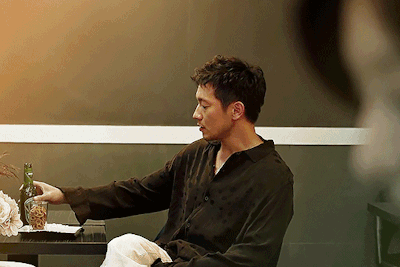
Besides the brilliant acting (of the trio, of the cast), the soundtrack of My Liberation Notes is also a protagonist. In moments of contemplative silence, it was the background music that told the story by filling in the gaps in the dialogues with emotion. And speaking of emotion, the final episode. I won't give a spoiler, of course, so I'll stick to an illustration. The 500₩ coin has small value, but it is still important, especially when put together with other coins. And the fact that it falls, but stays balanced, is an invitation to a new look: everything can go down the drain; everything can start again. "Something good will happen to you today," the daily reminder. And there is nothing more liberating than to notice change bubbling up from the inside out. Change that happens quietly, that doesn't come with magic formulas or from one day to another. It took the passage of time to demonstrate that days are not the same, even though they all seem the same because days have changed, even if not drastically, even if not all change has been positive because, at the end of the day, we realize that all change is necessary.
My notes on family relationships
"You still have the three of us by your side, Dad," recalling that scene thrills me because the family bond was strengthened as the chapters passed, as the Yeom needed each other. I loved the way it illustrated two completely distinct trios of brothers, either from each other within the triads themselves, or in the way the 'little family' of three brothers unraveled.

"When the time is right, you should meet your life partner, get married, have children, and watch them grow up. How is it that so many children today refuse to do this and grow old alone? (...) Try having a child. You will feel full without even eating. Every day will be amazing. You will be invincible," Mrs. Yeom's (Lee KyungSung) speech exposes the older people's thinking about what it means to be successful. Starting a family and leaving one's parents' home is the natural course of life, for some, it is a societal pressure that needs to be reviewed, for others. "Mom, after you had us, you enjoyed only two or three years of joy and pleasure, then your life became miserable. Do you really want to pass that kind of life on to us? And if we want to be happy all the time, should we keep having children until we are 80 years old? Until we die?," ChangHee, gives back to her mother something that left me thinking for quite a while, especially because we saw a matriarch who neglected who she was to take on the role of mother and wife, of glue that holds everyone together under the same roof, making the house her private universe of tiredness and sadness, like so many women around the world; a shame.
I love how Korean dramas, especially, address such simple, important issues in a natural way. I like the way they generate reflection from an everyday scene where dishes are washed or the table is set. I like how families are gathered around the table, sharing moments even though the only sound is the clinking of silverware on the dishes.
I didn't exist before 1991 and won't exist in 50 years, but I feel that I existed before that and will still exist after that.
My notes on reflections and mirrors
One thing I love about the scenes in My Liberation Notes is the way they show the characters through their reflections in the glass of their surroundings, as if they were given the freedom to watch themselves exist. This reminds me of MiJeong foaming with rage at Gu's house who, instead of going the natural way of a) questioning the person; b) pointing out solutions; c) getting indignant together; starts cooking for her. As she eats and he watches her, their features color the glass that separates them, lend tenderness to the moment of mutual understanding in which feelings are welcomed and respected.
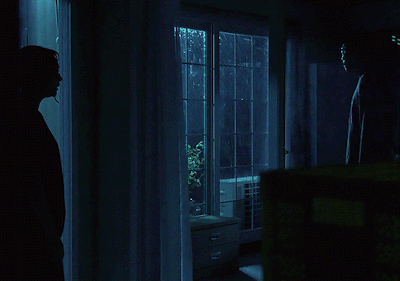
And when I think about reflection, I think about mirrors. And I think Gu and MiJeong work so well together because they don't demand what the other can't (or can't) give. And I have to say, that was the most faithful portrayal of an introvert I've ever seen in fiction. While ChangHee and GiJeong turn what they feel into (many!) words, the younger girl wanders through the days feeling trapped, suffocated; certain that she needs to create mental narratives to make it through another day and another and another. "I'm not going to pretend to be happy. I won't pretend to be unhappy. I will be honest," she admits to herself as she mixes stubbornness with courage until she decides that when spring comes, she will be a different person. And because she sees in Gu someone who also needs to see beyond what the eye can see, she invites him, hand in hand, to venture into this labyrinth of mirrors.
My notes on emptiness
"I'm not unhappy, but I'm not happy either (...) I'm exhausted. I don't know when everything started going wrong, but I'm exhausted." MiJeong's feelings invited me to reflect. Although, at first glance, it seems that she is just going through life, the plot reveals to us that her emptiness answers to the name of wasting away, words used to describe the malaise that afflicted thousands of people during the pandemic, for example, which can be explained as "absence of well-being (...) a silent despair."
"So why do I keep looking at my watch? I guess I feel a compulsion to live a productive day (...). I'm constantly looking at my watch and being chased by time." The feeling of not having time, of being wasting time, of not knowing how to enjoy the time one has, as if the happy moments are not enough to bring satisfaction, but the sad ones are not so extensive to cause dissatisfaction. And because she realized she was on the verge of, she sought liberation. Without knowing from what, without knowing why... I think that knowing what you don't want is as (or more!) important than knowing what you do want, and the protagonist's journey from the Liberation Club shows that you can always start over.
My notes on the liberation notes
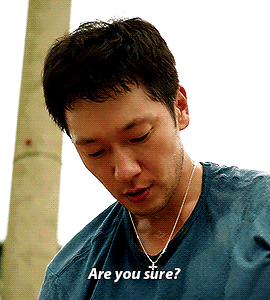
I want to take the opposite route and comment on the liberation that took place as the Liberation Club existed. Gu's relationship with drinking acted as an anesthesia to the guilt he carried; it was like taking a sip of death daily until it slowly came to collect him. And feeling guilt, in his case, was what made him live, because it left him in control of the daily punishment he imposed on himself; almost like a ritual (the genius of the text in linking this aspect with worship rituals). And the green, always tied to hope, is transformed into the proof of his failure, his shame. Until he meets MiJeong and the invitation to be different when spring comes. MiJeong gifted him with what he needed most: a purpose. And if there is one thing I learned from my pastor, it is that we should only give access to those who give us purpose; destiny.
With connection, small gestures would gradually cut through the rhythm dictated by alcohol: someone to eat and drink together, to walk home with, to send a message, to think while looking at the beauty of nature. But healing is not linear, we all know. And he falls. And he gets up. And falls again. But their connection is like the invisible thread (of love? always it!) that controls the ups and downs of the roller coaster of life. The release notes are symbolic, they require us to be willing to die in order to be born again, and in the end we realize that their release was just beginning. Because, in the end, they were freed from the bonds that kept them from feeling whole.
I want to see the sky while I am alive.
My Liberation Notes is among the best things I've ever watched. But I think it's not for everyone because it depends so much on the connection of the person watching it to the story being watched. One has to be willing to relate to the circumstances shown and connect with the characters; one has to be willing to access one's own emotions. If you are willing to do that, welcome to the Liberation Club! All 16 episodes of My Liberation Notes are available on Netflix.
Translated with www.DeepL.com/Translator







